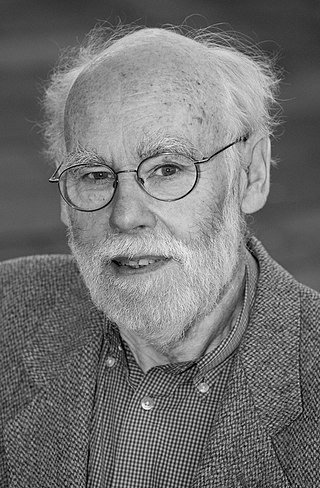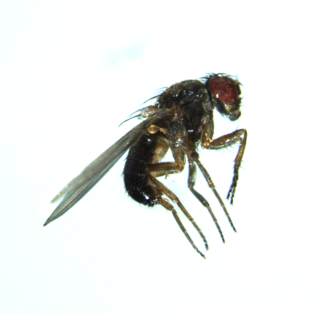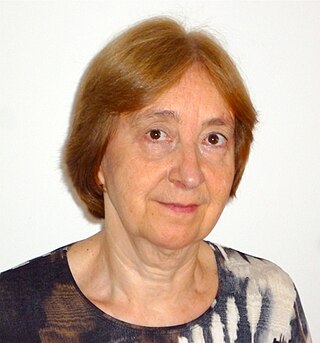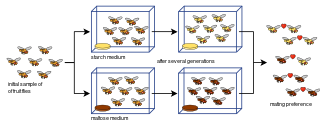
Drosophila is a genus of flies, belonging to the family Drosophilidae, whose members are often called "small fruit flies" or pomace flies, vinegar flies, or wine flies, a reference to the characteristic of many species to linger around overripe or rotting fruit. They should not be confused with the Tephritidae, a related family, which are also called fruit flies ; tephritids feed primarily on unripe or ripe fruit, with many species being regarded as destructive agricultural pests, especially the Mediterranean fruit fly.

Speciation is the evolutionary process by which populations evolve to become distinct species. The biologist Orator F. Cook coined the term in 1906 for cladogenesis, the splitting of lineages, as opposed to anagenesis, phyletic evolution within lineages. Charles Darwin was the first to describe the role of natural selection in speciation in his 1859 book On the Origin of Species. He also identified sexual selection as a likely mechanism, but found it problematic.

Theodosius Grigorievich Dobzhansky was a prominent Russian and American geneticist and evolutionary biologist. He was a central figure in the field of evolutionary biology for his work in shaping the modern synthesis. Born in the Russian Empire, Dobzhansky emigrated to the United States in 1927, aged 27.

Thomas Hunt Morgan was an American evolutionary biologist, geneticist, embryologist, and science author who won the Nobel Prize in Physiology or Medicine in 1933 for discoveries elucidating the role that the chromosome plays in heredity.
Selfish genetic elements are genetic segments that can enhance their own transmission at the expense of other genes in the genome, even if this has no positive or a net negative effect on organismal fitness. Genomes have traditionally been viewed as cohesive units, with genes acting together to improve the fitness of the organism. However, when genes have some control over their own transmission, the rules can change, and so just like all social groups, genomes are vulnerable to selfish behaviour by their parts.

Allopatric speciation – also referred to as geographic speciation, vicariant speciation, or its earlier name the dumbbell model – is a mode of speciation that occurs when biological populations become geographically isolated from each other to an extent that prevents or interferes with gene flow.
Richard Charles Lewontin was an American evolutionary biologist, mathematician, geneticist, and social commentator. A leader in developing the mathematical basis of population genetics and evolutionary theory, he pioneered the application of techniques from molecular biology, such as gel electrophoresis, to questions of genetic variation and evolution.

Genetic variation is the difference in DNA among individuals or the differences between populations. The multiple sources of genetic variation include mutation and genetic recombination. Mutations are the ultimate sources of genetic variation, but other mechanisms, such as genetic drift, contribute to it, as well.

Genetics and the Origin of Species is a 1937 book by the Ukrainian-American evolutionary biologist Theodosius Dobzhansky. It is regarded as one of the most important works of the modern synthesis, and was one of the earliest. The book popularized the work of population genetics to other biologists, and influenced their appreciation for the genetic basis of evolution. In his book, Dobzhansky applied the theoretical work of Sewall Wright (1889–1988) to the study of natural populations, allowing him to address evolutionary problems in a novel way during his time. Dobzhansky implements theories of mutation, natural selection, and speciation throughout his book to explain habits of populations and the resulting effects on their genetic behavior. The book explains evolution in depth as a process over time that accounts for the diversity of all life on Earth. The study of evolution was present, but greatly neglected at the time. Dobzhansky illustrates that evolution regarding the origin and nature of species during this time in history was deemed mysterious, but had expanding potential for progress to be made in its field.

Brian Charlesworth is a British evolutionary biologist at the University of Edinburgh, and editor of Biology Letters. Since 1997, he has been Royal Society Research Professor at the Institute of Evolutionary Biology (IEB) in Edinburgh. He has been married since 1967 to the British evolutionary biologist Deborah Charlesworth.

John Brookfield,, is a British population geneticist. He is Professor of Evolutionary Genetics at the University of Nottingham, in the School of Biology.

The history of model organisms began with the idea that certain organisms can be studied and used to gain knowledge of other organisms or as a control (ideal) for other organisms of the same species. Model organisms offer standards that serve as the authorized basis for comparison of other organisms. Model organisms are made standard by limiting genetic variance, creating, hopefully, this broad applicability to other organisms.

Drosophila pseudoobscura is a species of fruit fly, used extensively in lab studies of speciation. It is native to western North America.
Daven Presgraves is University Dean's Professor in the Department of Biology at the University of Rochester.
Martin Edward Kreitman is an American geneticist at the University of Chicago, most well known for the McDonald–Kreitman test that is used to infer the amount of adaptive evolution in population genetic studies.
Margaret Gale Kidwell is a British American evolutionary biologist and Regents’ Professor Emerita at the University of Arizona, Tucson. She grew up on a farm in the English Midlands during World War II. After graduating from the University of Nottingham in 1953, she worked in the British Civil Service as an Agricultural Advisory Officer from 1955-1960. She moved to the US in 1960 under the auspices of a Kellogg Foundation Fellowship to study Genetics and Statistics at Iowa State University. She married quantitative geneticist James F. Kidwell in 1961, obtained her MS degree in 1962 and moved with her husband to Brown University in 1963. She received her PhD from Brown University in 1973 under the guidance of Masatoshi Nei. From 1973 to 1984 she pursued independent research into a number of anomalous genetic phenomena in Drosophila which later lead to collaborative studies resulting in the discovery of hybrid dysgenesis and the isolation of transposable P elements. After appointment as Professor of Biology at Brown University in 1984 she moved to the University of Arizona in 1985 as Professor of Ecology and Evolutionary Biology. Additional positions included Chair of the Interdisciplinary Genetics Program from 1988-1991 and Head of the Department of Ecology and Evolutionary Biology from 1992-1997. Research at the University of Arizona has increasingly focused on the evolutionary significance of transposable genetic elements. In 1996, she was the first woman from Arizona to be elected to the United States National Academy of Sciences

Abraham Bentsionovich Korol is a professor in the Institute of Evolution at the University of Haifa. He is a prominent Israeli geneticist and evolutionary biologist known for his work on the evolution of sex and recombination, genome mapping and the genetics of complex traits. Korol was born in Bendery city, Moldavia, then part of the Soviet Union, and immigrated to Israel in 1991. Before immigrating to Israel, Korol was appointed in 1981 as a senior researcher and was awarded the degree of Doctor of Science by the Presidium of Academy of Science USSR in 1988, and became a full professor in 1991. After immigrating to Israel in 1991, Korol has established and headed the Laboratory of Population Genetics and Computational Biology in the Institute of Evolution at the University of Haifa. He became full professor there in 1996 and served as the director of the Institute of Evolution between 2008-2013. Since 1994, Korol has filled many scholarly positions including member of the steering committee of Israeli Gene Bank; member of the Human Genome Organization; member of the European Society of Evolutionary Biology; a member of the Coordinating Committee of the International Wheat Genome Sequencing Consortium; member of the Infrastructure Steering Committee of the Israeli Ministry of Science; representative of Haifa University in the Kamea program steering committee ; member of the Advisory Committee of Absorption in Science of the Israeli Ministry of Absorption.

Montserrat Aguadé Porres is a professor emeritus of genetics at University of Barcelona and member of the Institut d'Estudis Catalans.

Laboratory experiments of speciation have been conducted for all four modes of speciation: allopatric, peripatric, parapatric, and sympatric; and various other processes involving speciation: hybridization, reinforcement, founder effects, among others. Most of the experiments have been done on flies, in particular Drosophila fruit flies. However, more recent studies have tested yeasts, fungi, and even viruses.

Manyuan Long is a China-born American evolutionary biologist and geneticist, known for investigating the origination and evolution of new genes. He received numerous awards including the John Simon Guggenheim Memorial Fellowship for Biology (2022) and the Ray Wu Award (2022).













